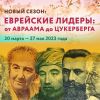Last week, Booknik read True Grit by Charles Portis, and later watched the book’s screen version by the Coen Brothers; later, he read a desperate story of the teenager’s coming of age near Moscow, and crime stories that outwitted their author; then, he remembered the first woman rabbi, noticed beautiful things in the world around him, marveled at water towers, tried to make sense of complicated relations in prominent Israeli families, almost drowned in a swamp, learned more S-words, made cynical remarks in deep freeze, traveled to North Africa, and then, he cooked some Norwegian soup a la Middle East, and Moroccan desserts. Meanwhile, Booknik Jr. looked forward to various holidays, worried about an envoy, fought for the peace on the Earth, made a hybrid of an apron and a table, attended theater, went on an excursion, and after that, he learned to resolve conflicts in an American school.
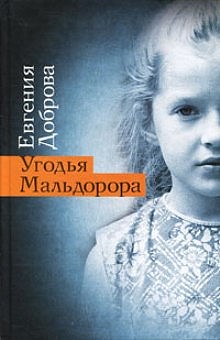
The Lands of Maldoror, by Yevgenia Dobrova
It is the 1980-90s. The era of the good old stagnation has been blown away with the furious blast of perestroika. Wood Road is a town outside Moscow, built for young scientists. It is a regular province, impoverished, gloomy, and criminalized. A half-village and a sub-city. The female protagonist of Yevgenia Dobrova’s book lives here. The girl’s parents are twice as marginal as their neighbors are. They basically live at the roadside. Booknik reviewer Yevgenia Ritz reads The Lands of Maldoror, and thinks about teenagers’ cruelty and kindness, as well as the dual character of everything around.
The Pen and the Syringe
On the night of January 2, 2011, in a Jerusalem jail the 62-years-old prisoner Eugene Perchikov aka Eyal Shahar committed suicide. He was also known as “Eugene Pepperow,” the author of rather well written crime stories published in Russia in the early 1990s. Booknik reviewer Lesya Bobrova tells the gripping story of a crime writer outwitted by his own creations. Or his fate.
…and many other true stories in the Books & Reviews section.
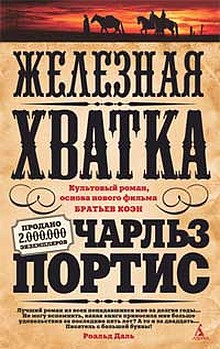
True Grit, by Charles Portis, directed by the Coen Brothers
The film by the Coen Brothers nominated for Oscar in ten categories, was premiered in Russia simultaneously with the Russian translation of the book by Charles Portis. Two looks at one thing do not guarantee that the resulting image will have depth. However, two minds are better than one, and this is probably the reason why the Coen Brothers work together. To watch results is easier with someone else, too, so we decided to publish a double review of the novel and its screen version. Here is the first piece by Booknik’s editor-in-chief Sergey Kuznetsov, and here is the second one by our contributing editor Dina Suvorova. As it always happens, their opinions differ.
Her Synagogue Was Everywhere. The First Woman Rabbi Regina Jonas
When the American Sally Priesand was ordained as a rabbi in 1972, everyone saw a breakthrough in this, a kind of victory in the feminist struggle in the Judaism. It became clear that the practice of female rabbinism would continue. However, almost no one at that time remembered that Ms. Priesand had a predecessor. It was only in the late 1980s when researchers had access to the German archives in Potsdam, some unique documents saw the light of the day, revealing the forgotten biography of the first woman rabbi in history, Regina Jonas. Our contributor Yekaterina Vasilyeva tells the story of that unusual woman.
…and many other true grips in the Articles & Interviews section.
Booknik Blog: Recommendations of Our Weathermen, Jewish Social Networks, and the Best Jewish Books
With much pleasure, Booknik announces that from now on, he is not going to miss the smallest details of everything beautiful observed in the world around him. What films the weathermen recommend to watch this very cold February? Can a social network turn into the Ministry of Absorption (and what happens next)? What Jewish field commander in the USSR opposed the foundation of the state of Israel? What are the best fifty Jewish books in the last one hundred years? All this and more in Booknik Blog maintained by our contributing editor Mila Dubrovina.
…and many more true details in the Events & Reports section.
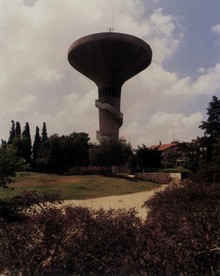
Similar to Portugal, the land of lighthouses, Netherlands, the country of windmills or Czechia that is proud of its unofficial title of the realm of forest watchtowers, Israel may be called the land of water towers. Kibbutzim and moshavim appeared only thanks to them. One cannot view the changing landscape of Erez Israel without water towers. These constructions are the visual symbol of the national rebirth, and the Jewish presence in this land. Our Israeli reporter Ariel Bulstein attended the exhibition on water towers, and now reports what he saw there in the first installment of our new cultural column The Jerusalem Streetcar.
15 Facts about Israeli Dynasties
In the 1970s, in the Israeli public discourse there appeared a new notion of “princes.” No, the State of Israel never turned to monarchy. It was only that the generation of contemporary Israel, and its political and social institutions founding fathers’ progeny grew up. These unspoken heirs were called “princes.” Ariel Bulstein reveals some pretty amazing facts about intricate family relations in Israel.
Moroccan Sweets
Our intrepid chef Keren Pevzner gives final details of the Shabbat celebration in a Moroccan family. Predictably enough, it ended with desserts, and Keren shares some recipes with our readers.
…and many other true romances in the Columns & Columns section.
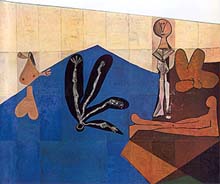
Pinya tragically perished in 1919, in the midst of the Civil War, when he crossed marshes from one demolished settlement to another. He ran with his entire family and neighbors, and when they decided to stop for some rest, something distracted him, and he drowned. “Ay, schlimazel!” was the last thing he heard. Booknik publishes another story by our contributor Pavel Zhuravel.
…and many other true accounts in the Stories & Essays section.
Don’t Grudge the Brew 75: Norwegian Salmon Soup
Cooking is like music. Everyone understands its language, and it easily crosses all national borders. From Shanghai, for example, you may bring the recipe for marvelous Norwegian fish soup. Why not? Before, it was called “rootless cosmopolitanism,” and now we prefer the term “global village.” Booknik’s own culinary maestro Roman Gershuni brilliantly cooks the Norwegian dish with the Middle Eastern flavor.
Hebrarium, the Lexicon of Jewish Whatnots: S3
What did Sarah laugh at? How many judges made the Sanhedrim? Who are the Subbotniks? Watch our Hebrarium, and Kirill Chichayev will tell Tchaikovsky you the news.
Question to Question № 5: Andrey Gelasimov
The spirited author Andrey Gelasimov is quick to answer to questions with questions, sometimes in the proportion three to one. In five minutes of this interview made by Nikolay Alexandrov, you will hear about his three children, the cohabitation of Russian and Jewish cultures, the principal erotic story in the global literature, his unfinished novel The Cold, and how to be a cynic when the temperature is minus forty Centigrade.
Question to Question № 6: Gleb Shulpyakov
The poet and author Gleb Shulpyakov is comfortable on his couch. Dr. Freud is played by our host Nikolay Alexandrov. The session covers the travels to North Africa, Jerusalem, and Tel Aviv.
…and many other true adventures in the Video Blog section.
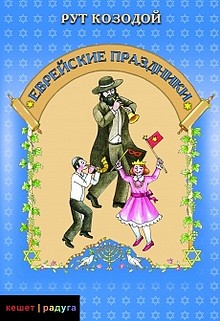
The Book of Jewish Holidays, by Ruth Kozodoy
The book about holidays is always nice to have around. It is not because you do not know anything about them, quite the opposite. The reason is, when all holidays are over, and you do not have anything else to look forward to, you could at least read about them. Alexandra Dovlatova-Mechik does exactly that. She reads the book by Ruth Kozodoy published in the Keshet series supported by the AVI CHAI Foundation.
Not a Traitor But an Envoy
Flavius Josephus (Yoseph Ben Mattithyahu) was the famous Jewish historian, and military commander. He wrote two major historical books, The Jewish War, and Antiquities of the Jews. Marina Karpova and Yevgeny Levin give ten facts about the man who had a hard, and very ambiguous life.
Fighters for Peace
Goggle-Eyes, by Anne Fine
The new book by Anne Fine is called Goggle-Eyes. This is a nickname, and not very pleasant at that. Kids call it the friend of their mom. Their mom, Kitty, and small Judy fight for peace, and nuclear disarmament, but Gerald does not have anything against nuclear energy. He also believes the dishes should be washed right after meals, the room should be cleaned regularly, and the kids should be their mother’s little helpers. In brief, he is a terrible killjoy, and a conservative to boot. However, it turns out, his advice may be quite sound. Booknik Jr. gladly publishes an excerpt of this book.
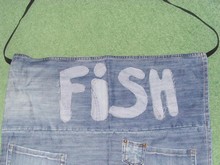
Our contributor Anton Markin’s dad says that February 23 is the Fantomases’ holiday. By them, he means those who used to live the phantom country, the USSR. The country is no longer there, but its celebrations cling on. He still loves his presents, though. This is why his son creates a hybrid of an apron and a table for him.
The Mystery of a New Chair
The Ugly Duckling, by A. A. Milne, at the Et Cetera Theater
This is a fairy tale written by the famous children’s author, and performed in Russian for the first time. The story is simple enough. The king and the queen want to marry their daughter, and no one wants to take her. Everyone speaks about her ugliness, and even she believes it herself. Alexandra Dovlatova-Mechik attends the theater, and sees rows of chairs a beautiful tale there.
The Memory and the Name. Yad Vashem
In the early 2011, in the Holocaust Martyrs' and Heroes' Remembrance Authority, the free tours are conducted in Russian. Every one of them is dedicated to a certain moment in the Shoah history. Yelizaveta Guller attends the tour arranged by Yelizaveta Davidovich, “The Art of the Shoah Period.”
American Tattletales
About a month ago, my ten-year-old son came home from school, and he was very sad. “Mom, I decided not to be friends with one boy,” he said from the door. “He said all Russians are stupid.” My heart missed a beat with a righteous anger. Are we? Myself? My husband? My father? Everyone from Russia? Can Professor Kapitsa be stupid? Nabokov a dork? Sofya Kovalevskaya a silly cow? Alena Smiryagin tells about conflict solving in American schools.
…and many other true crimes methods at Booknik Jr., also known as Family Booknik, our own web site for kids and their parents.
Are you gonna pull those pistols or whistle “Dixie”? Booknik and Family Booknik are supported by the AVI CHAI Foundation.









